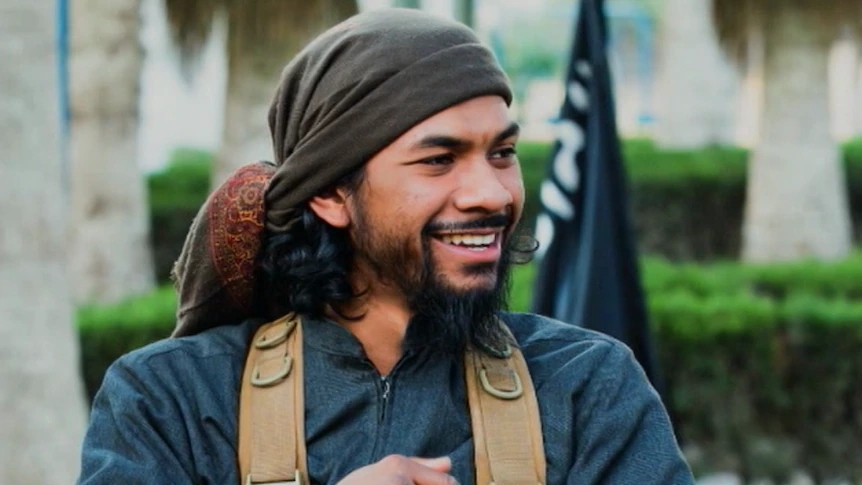ISIS terrorist Abu Khaled al-Cambodi charged in Australia, media uses earlier name Neil Prakash
Abu Khaled al-Cambodi, an ISIS terrorist, has been charged with terror offences in Australia after he was extradited from Turkey. While all media in Australia and across the world has reported the development, all of them deliberately tried to insinuate that he is not a Muslim.
All media reports used his former name Neil Prakash, which sounds like the name of a Hindu from India. While his original was indeed Neil Prakash, it is no longer his name. He was originally Buddhist, and he converted to Islam in 2012. After converting to Islam, Neil Prakash adopted the name Abu Khaled al-Cambodi, referring to his Cambodian root.
Abu Khaled al-Cambodi was born in Melbourne in Australia to an Indo-Fijian father and Cambodian mother. He said that when he visited Cambodia with his family, he saw that Buddhist people were worshipping idols in temples, and he was disgusted by it. Therefore, after returning to Melbourne in 2012, he learned that one of his friends was invited and had converted to Islam. Following his friend, he also converted in that year and joined the terror group in 2014.

Since then, he has been using the name Abu Khaled al-Cambodi, for some reason, the media keeps using his old name Neil Prakash, which definitely creates a wrong impression about his religious affiliation.
More importantly, the media reports dos not even mention that he is now known as Abu Khaled al-Cambodi, and only used his old name in the reports. There is no mention that he converted to Islam from Buddhism and changed his name to an Islamic name before joining ISIS.
This seems to a deliberate attempt by media houses to suggest that the ISIS terrorist is not Muslim.
It is notable that these are the same media houses that insist on referring to a man as a woman if he identifies himself as a woman, and cancels people for referring to such people with their birth gender even if such people have not undergone any sex change procedure. But here, Neil Prakash converted to Islam from Buddhism, and changed his name to Abu Khaled al-Cambodi, but the media houses still refer to his earlier name.
Abu Khaled is accused of travelling to Syria to take part in the terror activities of ISIS. Among the charges that he is facing in Australia include engaging in hostile activity in a foreign state and country, being a member of a terrorist organisation, supporting and advocating for terrorism. He has also been named in two terror plots in Australia.
Abu Khaled al-Cambodi had become a prolific online supporter of ISIS, and had released several videos appealing to Australians to join the terror group. In April 2016, it was wrongly assumed that he had died in an air strike by the USA in Iraq, but had survived with injuries.
His association with the terror group did not last long. He was arrested in 2016 in Turkey after entering the country for Syria, on the charges of fighting for ISIS. While Australia had requested his extradition as an arrest warrant was issued in Australia also in 2016, the Turkish govt had rejected it and was put on trial. In 2018, Australia revoked his citizenship, saying that he will not become stateless as he was also a Fijian citizen through his father. But Fiji rejected this claim and denied him citizenship in 2019.
A Turkish court sentenced him to seven and a half years in 2019. As he had already served time in jail during the trial since his arrest in 2016, his term was completed in February 2022. He was moved to an immigration detention centre as both Australia and Fiji refused to grant him citizenship.
However, Abu Khaled al-Cambodi was deported from Turkey to Australia last week, and he was flown to Darwin where he was arrested by Australian Federal Police. After that, a court in Darwin ordered his extradition to Victoria, and now is facing trial in Melbourne Magistrate’s court.
His arrest in Australia came after a joint investigation by Australian Federal Police and Victoria Police as part of a counter-terrorism operation since his arrest in Turkey.




![World Bank Approves $600 million for Türkiye to Revive Micro Enterprises in Earthquake-Hit Areas [EN/TR] – Türkiye World Bank Approves $600 million for Türkiye to Revive Micro Enterprises in Earthquake-Hit Areas [EN/TR] – Türkiye](https://reliefweb.int/sites/default/files/styles/large/public/previews/1d/98/1d98677e-2a87-4b5f-9730-78388e5968f6.png)